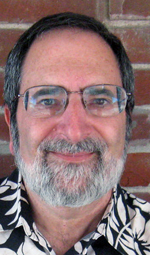By Laurie Baron

SAN DIEGO-If only Canadian filmmaker Alan Zweig’s comments and questions were as funny as his voice, this would be a hilarious movie. Zweig, who sounds like a cross between Gilbert Gottfried and Arnold Stang, queries famous Jewish comedians about why Jews once dominated the field of American comedy and no longer do so. To the extent that he gets them to speculate about the sources of Jewish humor and tell their favorite Jewish jokes, the film delivers laughs.
As the film progresses, however, Zweig admits that his real purpose in excavating the roots of Jewish humor is to provide a basis for his young daughter’s Jewish identity. This seems a Sisyphean task considering Zweig is intermarried and dissociates himself from Judaism, Israel, or any other secular Jewish ideology. Comedienne Cory Kahaney perceptively summarizes Zweig’s intent which detours the film from an exploration of the collective origins of American Jewish comedy towards an idiosyncratic quest for what it means to be Jewish: “So basically you’re making a film because you feel guilty that you married a Gentile, that you didn’t raise your daughter Jewish, that you didn’t give her a bat-mitzvah. I don’t know that we can solve all your problems.” Zweig frankly responds, “Maybe she’ll be Jewish because she’ll be sarcastic.”
If you listen to the comedians and ignore Zweig’s shallow remarks about what he considers authentically Jewish, then much of the film can be enjoyable. Shelly Berman and Jack Carters dismiss Zweig. Although they pride themselves on being Jewish, their routines were pitched at general audiences and never dwelled on Jewish themes. Others like David Steinberg claim, “Jews own humor.” The interviewed attribute Jewish wit to a variety of reasons: a coping mechanism for oppression, estrangement from the dominant cultures in the Diaspora, the exploitation of stereotypes, the guttural sound of Yiddish, the immigrant experience, the rhythms of Jewish argumentation, self-denigration, and tough Borscht Belt audiences. As the title suggests, Zweig and many of the comedians he interviews feel that the heyday of American Jewish comedians has passed. Acceptance and Assimilation have dulled the ironic sensibility and resentment Jews formerly possessed.
Since Zweig abandons his original investigation of why Jews were disproportionately represented in American popular culture between 1940 and 1970, he never follows up on the answers his questions elicit. For example, is the American comic tradition dead? He conducts interviews with many younger comedians whose birthplaces are more like to have been in the suburbs than in the shtetl or the Lower East Side. The only two women who appear in the film are Judy Gold and Cory Kahaney, both of whom were born in the 1960s and whose careers resulted from doing standup at comedy clubs and the opportunities that late night talk shows, and cable comedy programming afford. Gold bases much of her act on stereotypical Jewish family dynamics; whereas Kahaney recalls her Bohemian childhood with the quip, “If it’s Tuesday, it must be Ram Dass.”
There are some puzzling absences in Zweig’s roster of comedians. Woody Allen, Mel Brooks, Robert Klein, Joan Rivers, Adam Sandler, Sarah Silverman, and Wendy Liebman immediately come to mind. He inserts some tantalizing snippets from the routines of deceased comics like Rodney Dangerfield, Alan King, Jackie Mason, and Henny Youngman, but omits clips of Jewish humorists like Molly Berg, Myron Cohen, Sam Levenson, Molly Picon, and Alan Sherman whose material drew primarily from their Jewish backgrounds. Moreover, Zweig failed to interview any scholars like Vincent Brook, Lawrence Epstein, and Ruth Wisse whose informed insights would have enriched the generalizations proffered for the Jewish penchant for comedy.
I’d recommend the recent documentaries about David Steinberg (Quality Balls) and the Borsht Belt comedians (When Comedy Went to School) over When Jews Were Funny. I’d also suggest that Zweig make a sequel called Jews Are Still Funny. Ah, nostalgia isn’t what it used to be, If Zweig can only find Jewish humor in the past, I’d tell him to go to Chelm.
*
Baron is professor emeritus of history at San Diego State University. He may be contacted via lawrence.baron@sdjewishworld.com